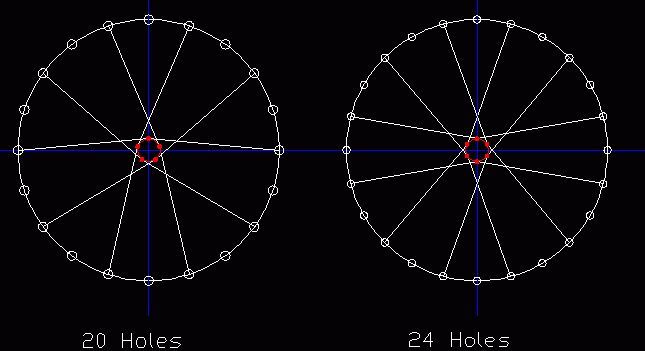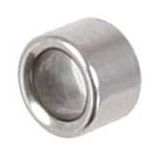|
Spoke-end
Diameter
|
Spoke
Length
24H |
Spoke
Length
20H |
|||
|
Drive
side
|
Left
side
|
Drive
side
|
Left
side
|
||
|
515
|
253
|
256
|
259
|
261
|
|
|
520
|
255
|
258
|
262
|
263
|
|
|
525
|
258
|
261
|
264
|
266
|
|
|
530
|
260
|
263
|
267
|
268
|
|
|
535
|
263
|
266
|
269
|
271
|
|
|
540
|
265
|
268
|
272
|
273
|
|
|
545
|
268
|
271
|
274
|
276
|
|
|
550 |
270
|
273
|
277
|
278
|
|
|
555
|
273
|
276
|
279
|
281
|
|
|
560
|
275
|
278
|
282
|
283
|
|
|
565
|
278
|
281
|
284
|
286
|
|
|
570
|
280
|
283
|
287
|
288
|
|
|
575
|
283
|
286
|
289
|
290
|
|
|
580
|
285
|
288
|
292
|
293
|
|
|
585
|
288
|
291
|
294
|
295
|
|
|
590
|
290
|
293
|
297
|
298
|
|
|
595
|
293
|
296
|
299
|
300
|
|
|
600
|
295
|
298
|
302
|
303
|
|
|
605
|
298
|
301
|
304
|
305
|
|
|
610
|
300
|
303
|
307
|
308
|
|
|
615 |
303
|
306
|
309 |
310 |
|
Table A
Note: We list "spoke-end diameters" every 5mm step. If your "spoke-end diameter" measure is in between 2 steps adjust your spoke length consequently.
Rim offset:
(normally 2 - 3mm) influences the spoke length for an average 0.3mm.
You may neglect it or eventually use that tiny amount just for rounding
lengths to the available spoke size.
3) Lacing pattern
Lacing: correct lacing patterns with straight-pull spokes must be as shown below.

4) Spoke Materials
Steel
Spokes: Hub
f langes accept standard spoke heads however
we recommend to use only high quality "butted" steel spokes.
Butted spokes are lighter and allow a better spoke
aligningment that translates in a reduced stress of
the parts and an overall stiffer lacing.
Berd
spokes:
Flanges
are designed to fit Berd spokes too.
All edges are well rounded thereafter "Tangential
Straightpull Inserts" are not necessary.
Consequently adjust Table A lenghts as follows:
-
subtract 2mm from Table values
if "Without
Tangential Straightpull Inserts"
- keep
same values on Table
if "With
Tangential Straightpull Inserts"
Berd Tangential Straightpull Insert

Carbon-Titanium
Spokes: Hub
flanges accept composite spoke that feature
standard thin metal ends (Titanium
or Steel) since
the short metal head should be well bendable in order to get the spoke correctly
aligned with the rim.
When lacing Carbon Titanium spokes make sure to add this important step to
the lacing process:
- As spokes are fully tensioned settle
spoke heads (before
final truing).
- To settle
spoke heads
push the metal area of the spoke immediately after the hub flange with
a small wood/plastic rod in order to settle them permanently to the exact
direction.
- Then execute the final truing.
Note
that cabon-metal spokes are extremely sensitive to the following:
- Twist: thread-to-head section should never get twisted not even during lacing.
- Spoke to nipple-alignment: each nipple should get perfectly aligned with
its spoke.
-
Avoid exposure to hi-temperatures
as behind car windows under hot sun, transport, storage etc.
-
Avoid hits with any hard object
during
riding, transport,
storage etc.
Fully
respect these basic info before and after installation.
![]()